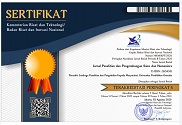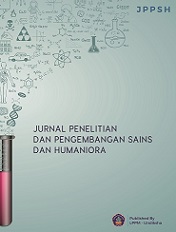Students’ Perception: The Technology Integration into Project-Based Learning in Writing Class
DOI:
https://doi.org/10.23887/jppsh.v6i3.52539Keywords:
Project-based Learning, technology integration, students' perception, writing classAbstract
Technology-assisted Project-based Learning is an innovative teaching strategy brought by the inevitability of information and communication technology. The present study examined the students' perception of technology integration into Project-based Learning in writing class. The study adopted an explanatory sequential mixed-method design. A total of 98 English students agreed to participate in the study. The data were collected through close-ended questionnaire forms and interviews to support the findings from the questionnaires. The data were analyzed by calculating the questionnaire responses using descriptive quantitative analysis and supporting them with a qualitative description and interpretation. The finding revealed that the students responded positively to technology-assisted Project-based Learning in their writing class. Seven items of the affective domain showed the students obtained positive experiences during the technology integration. Besides, six items of the cognitive domain also showed high percentages that indicated students' positive responses. Lastly, two items of the psychomotor domain showed that the technology encouraged them to be more active and enthusiastic. Therefore, this result implies that teachers and students should embrace technology integration to improve learning processes and outcomes.
References
Abhari, H., & Salehi, H. (2021). Evaluating Major Problems of MA Students of TEFL in Developing Proposals: MA Students and Their Professors’ Perceptions in Focus. Journal of Critical Studies in Language and Literature, 2(5), 32–37. https://doi.org/10.46809/jcsll.v2i5.85.
Adnyani, P. E., Myartawan, I. P. N. W., & Saputra, I. N. P. H. (2021). Teacher’s Problems and Solutions in Implementing Student-Centered Learning in SMAN Bali Mandara Singaraja. Journal of Research on English and Language Learning, 2(2), 101–106. https://doi.org/10.33474/j-reall.v2i2.10133.
Aghayani, B., & Hajmohammadi, E. (2019). Project-Based Learning: Promoting Efl Learners’ Writing Skills. Journal: A Journal on Language and Language Teaching, 22(1). https://doi.org/10.24071/llt.2019.220108.
Alakrash, H. M., & Razak, N. A. (2021). Technology-based language learning: Investigation of digital technology and digital literacy. Sustainability (Switzerland), 13(21). https://doi.org/10.3390/su132112304.
Albiladi, W. S. (2022). English Teaching and Learning in Saudi Arabia: Emerging Practices and Strategies for Achieving the Educational Objectives of the Saudi Vision 2030. Journal of Language Teaching and Research, 13(4), 781–789. https://doi.org/10.17507/jltr.1304.11.
Albogami, M. M. (2022). Do Online Classes help EFL Learners Improve their English Language skills? A Qualitative Study at a Saudi University. Arab World English Journal (AWEJ), 2, 281–289. https://doi.org/10.24093/awej/covid2.18.
Alied, N. A., Alkubaidi, M. A., & Bahanshal, D. A. (2022). The Use of Blogs on EFL Students’ Writing and Engagement in a Saudi Private School. Journal of Education and Learning, 11(4), 144. https://doi.org/10.5539/jel.v11n4p144.
Almelhi, A. M. (2021). Effectiveness of the ADDIE Model within an E-Learning Environment in Developing Creative Writing in EFL Students. English Language Teaching, 14(2), 20. https://doi.org/10.5539/elt.v14n2p20.
Alotaibi, M. G. (2020). The Effect of Project-Based Learning Model on Persuasive Writing Skills of Saudi EFL Secondary School Students. English Language Teaching, 13(7), 19. https://doi.org/10.5539/elt.v13n7p19.
Alsied, S. M. (2019). The Role of Mobile Phones as Effective Tools for Language Learning by Libyan EFL Learners. JEELS (Journal of English Education and Linguistics Studies), 6(2), 135–163. https://doi.org/10.30762/jeels.v6i2.1234.
Apriliani, A. I., & Listyani, L. (2021). Students’ Perceptions on English Fun Fair as an Implementation of Project-Based Learning in Speaking for Social Purposes Classes. Celt: A Journal of Culture, English Language Teaching & Literature, 20(1), 73. https://doi.org/10.24167/celt.v20i1.2677.
Chatta, B., & Haque, M. (2020). Improving Paragraph Writing Skills of Saudi EFL University Students Using Flipped Classroom Instruction. Arab World English Journal (AWEJ), 6, 228–247. https://doi.org/10.24093/awej/call6.15.
Creswell, J. W., & Clark, V. L. P. (2011). Designing and Conducting Mixed Methods Research. In Fire Risk Management (2nd ed.). Thousand Oaks, CA: Sage Publications.
Daweli, T. W. (2018). Engaging Saudi EFL Students in Online Peer Review in a Saudi University Context. Arab World English Journal (AWEJ), 9(4), 270–280.
Dwiyanti, K. E., & Suwastini, N. K. A. (2021). Assessment for writing skills in online learning. Lingua Scientia, 28(1), 8–19. https://doi.org/10.23887/ls.v28i1.29069.
Hadi, M. S., Izzah, L., & Paulia, Q. (2021). Teaching Writing through Canva Appication to Enchance Students’ Writing Performance. JOLLT Journal of Languages and Language Teaching, 9(2), 228–235. https://doi.org/10.33394/jollt.v%vi%i.3533.
Hazaymeh, W. A. (2021). EFL Students’ Perceptions of Online Distance Learning for Enhancing English Language Learning During Covid-19 Pandemic. International Journal of Instruction, 14(3), 501–518. https://doi.org/10.29333/iji.2021.14329a.
Hernandez, S. S. F., & Flórez, A. N. S. (2020). Online Teaching during Covid-19: How to Maintain Students Motivated in an EFL Class. Linguistics and Literature Review (LLR), 6(2), 157–171. https://doi.org/10.32350/llr.62.14.
Hidayati, K. H. (2018). Teaching Writing to EFL Learners: An Investigation of Challenges Confronted by Indonesian Teachers. 4(1), 21–31.
Ismuwardani, Z., Nuryatin, A., & Doyin, M. (2019). Implementation of Project Based Learning Model to Increased Creativity and Self-Reliance of Students on Poetry Writing Skills Article Info. Journal of Primary Education, 8(1), 51–58. https://doi.org/10.15294 /jpe.v8i1.25229.
Kawinkoonlasate, P. (2019). Integration in Flipped Classroom Technology Approach to Develop English Language Skills of Thai EFL Learners. English Language Teaching, 12(11), 23. https://doi.org/10.5539/elt.v12n11p23.
Lestari, S., & Chasanatun, T. W. (2018). Applying Technology in Teaching English: Padlet, Animoto, and Sway. 222(SoSHEC), 77–80. https://doi.org/10.2991/soshec-18.2018.16.
Lu, Q. (2021). A New Project-Based Learning in English Writing. International Journal of Emerging Technologies in Learning, 16(5), 214–227. https://doi.org/10.3991/ijet.v16i05.21271.
Maheswari, P. A. M., Adnyani, N. L. P. S., & Suwastini, N. K. A. (2020). Interlanguage analysis on Indonesian EFL learners’ compositions. Lingua Didaktika: Jurnal Bahasa Dan Pembelajaran Bahasa, 14(2), 121–131. https://doi.org/10.24036/ld.v14i2.108643.
Mahmood, K. (2020). Academic Writing Challenges of EFL Learners and Teachers’ Proficiency in Pakistani Higher Education. Journal of Research in Social Sciences, 8(2), 56–76. https://doi.org/10.52015/jrss.8i2.55.
Manik, N. P. I. M. C., & Suwastini, N. K. A. (2020). Analyzing grammatical error in students’ recount text writing in junior high school. Humanis, 24(3), 238–246. https://doi.org/10.24843/jh.2020.v24.i03.p02.
Mudra, H. (2020). Digital Literacy Among Young Learners: How Do EFL Teachers and Learners View Its Benefits and Barriers? Teaching English with Technology, 20(3), 3–24.
Nhu, N. T. H., & Dan, T. C. (2022). the Challenges and Solutions Towards High-Qualified English Studies Program Students Experienced Online Learning Amidst Coronavirus Pandemic - a Case At Can Tho University, Vietnam. European Journal of Applied Linguistics Studies, 4(2), 103–133. https://doi.org/10.46827/ejals.v4i2.332.
Qing, H. (2019). Study on the Project-based Approach to Teaching EFL Writing for Students in Sport Universities. 2(7), 116–118. https://doi.org/10.25236/FER.2019.020722.
Rahmawati, A., Suryani, N., & Akhyar, M. (2020). Technology-Integrated Project-Based Learning for Pre-Service Teacher Education: A Systematic Literature Review. In Open Engineering. degruyter.com. https://doi.org/10.1515/eng-2020-0069.
Rao, C., & Durga, S. (2018). Developing Students’ Writing Skills in English-A Process Approach. Journal for Research Scholars and Professionals of English Language Teaching, 6(6), 1–5.
Ratminingsih, N. M., Marhaeni, A. A. I. N., & Vigayanti, L. P. D. (2018). Self-Assessment: The Effect on Students’ Independence and Writing Competence. International Journal of Instruction, 11(3), 277–290. https://doi.org/10.12973/iji.2018.11320a.
Sa’diyah, I. H., & Cahyono, B. Y. (2019). Effect of Project-Based Learning through blogging on EFL students’ writing ability. Journal on English as a Foreign Language, 9(2), 199–216. https://doi.org/10.23971/jefl.v9i2.1341.
Shirvani, M., & Porkar, R. (2021). How Do EFL Students Perceive Brainstorming in L2 Writing Classes? Theory and Practice in Language Studies, 11(12), 1602–1609. https://doi.org/10.17507/tpls.1112.12.
Somani, R., & Rizvi, M. (2018). Project Based Learning over Traditional Method of Language Teaching: A Quasi Experiment Design in EFL Classrooms. Literacy Information and Computer Education Journal, 9(2), 2895–2906. https://doi.org/10.20533/licej.2040.2589.2018.0381.
Syahrizal, T., & Rahayu, S. (2020). Padlet for English Speaking Activity: a Case Study of Pros and Cons on Ict. Indonesian EFL Journal, 6(2), 149. https://doi.org/10.25134/ieflj.v6i2.3383.
Taufikurohman, I. S. (2018). The Effectiveness of Using Padlet in Teaching Writing Descriptive Text. JALL: Journal of Applied Linguistics and Literacy, 2(2), 71–88. https://doi.org/10.25157/jall.v2i2.2190.
Toba, R., Noor, W. N., & Sanu, L. O. (2019). The Current Issues of Indonesian EFL Students’ Writing Skills: Ability, Problem, and Reason in Writing Comparison and Contrast Essay. Dinamika Ilmu, 19(1), 57–73. https://doi.org/10.21093/di.v19i1.1506.
Williams, C., & Beam, S. (2019). Technology and writing: Review of research. Computers and Education, 128, 227–242. https://doi.org/10.1016/j.compedu.2018.09.024.
Wu, W. C. V., Yang, J. C., Scott Chen Hsieh, J., & Yamamoto, T. (2020). Free from demotivation in EFL writing: the use of online flipped writing instruction. Computer Assisted Language Learning, 33(4), 353–387. https://doi.org/10.1080/09588221.2019.1567556.
Yamada, H. (2021). An Implementation of Project-Based Learning in An EFL Context: Japanese Students’ and Teachers’ Perceptions Regarding Team Learning. TESOL Journal, 12(1). https://doi.org/10.1002/tesj.519.
Yulia, H., & Paseleng, M. C. (2021). Online Learning from The Higher Education Students ’ Point of View (Study at a Private University in Central Java Indonesia). Psychology, Evaluation, and Technology in Educational Research, 3(2), 89–97.
Yundayani, A., Susilawati, & Chairunnisa. (2019). Investigating the effect of Canva on students’ writing skills. Journal of English Education, 7(2), 169–176. https://doi.org/10.25134/erjee.v7i2.1800.Received.
Yunus, M. M., Haleman, K. N., Junaidi, Y., & Suliman, A. (2020). Using “the write stuff” module to enhance the writing skills of ESL primary school students. International Journal of English Language and Literature Studies, 9(4), 315–329. https://doi.org/10.18488/JOURNAL.23.2020.94.315.329.
Zhang, R., & Zou, D. (2021). Types, features, and effectiveness of technologies in collaborative writing for second language learning. Computer Assisted Language Learning, 0(0), 1–31. https://doi.org/10.1080/09588221.2021.1880441.
Downloads
Published
Issue
Section
License
Copyright (c) 2022 Kadek Intan Rustiana Dewi, Ni Nyoman Padmadewi, Luh Putu Artini

This work is licensed under a Creative Commons Attribution-ShareAlike 4.0 International License.
Authors who publish with the Jurnal Penelitian dan Pengembangan Sains dan Humaniora agree to the following terms:
- Authors retain copyright and grant the journal the right of first publication with the work simultaneously licensed under a Creative Commons Attribution License (CC BY-SA 4.0) that allows others to share the work with an acknowledgment of the work's authorship and initial publication in this journal.
- Authors are able to enter into separate, additional contractual arrangements for the non-exclusive distribution of the journal's published version of the work (e.g., post it to an institutional repository or publish it in a book), with an acknowledgment of its initial publication in this journal.
- Authors are permitted and encouraged to post their work online (e.g., in institutional repositories or on their website) prior to and during the submission process, as it can lead to productive exchanges, as well as earlier and greater citation of published work. (See The Effect of Open Access)









